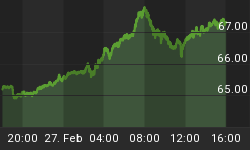I read a piece this morning by Josh Brown, the Reformed Broker, in which he destroys the 1999 comparison for the stock market. He makes some excellent points about why the stock market is not only not over valued compared to 1999, but is actually a bargain. You should read it because we should all be considerate of rational views.
I also read The Fed is NOT Printing Money by Jesse's Cafe', which offers a view into a money creation process that is more geared toward the gaming of the financial markets through intermediary banks than it is the normal inflation of old. I mean seriously, I do not call Ben Bernanke an evil genius for nothing; it seems that he and his associates have taken monetary policy to the Nth degree and figured out how to paint inflation as non-inflationary. Our hero.
The point is that I think Josh Brown is 100% right. There is no mania in stocks. In fact, stocks' worst offense right now is that they are strenuously over bought and sponsored by 'dumb money' aggregates that are equal and opposite to one year ago, when the same dumb money was exactly as bearish as it is bullish today. As he notes, the mainstream public may no longer be interested in the markets, but whoever that dumb money is, they proved a good indicator on an imminent bull phase last May. Again, we present the proof compliments of Sentimentrader.com:

Smart-Dumb money sentiment 1 year ago

Smart-Dumb money sentiment today
I have absolutely no problem being bullish on the stock market because it is made up of companies both bad and good; very good. After Memorial Day, my wife will re-start her career at a currently non-public technology company about which we are very excited. Its technology began as the founder's MIT thesis and is now rolling out into major markets and outlets. One brilliant kid, an idea, a market and voila.
I totally believe in human progress and what great companies like Microsoft, Intel and later Google and Apple have brought us. I believe in the software systems that are making the burdensome healthcare system more manageable and great companies the world over that fill a need, improve lives and win out in the markets of public opinion and financial transaction.
But the point I think the Reformed Broker is missing is what underpins the market of stocks in these corporations. Looking at the stock market as a stand-alone, I tend to agree with his viewpoint. But when policy makers are woven into the fabric of the market to this degree, they must be factored. Questions must be asked like "why on earth, with this excellent and healthy stock market and sufficiently functioning economy are they continuing to repress interest rates by buying $85 billion in bonds per month?"
Aren't those bonds debt? Where did that debt come from? Does bloated debt not imply that the economy in which the stock market's components ply their trade is a leveraged thing, as opposed to an organically thriving thing? Why can't we just let the debt float on the open market and let it get resolved by the market if things are so good beneath the surface?
I think you know the answers to those questions. That is the main point of bears questioning the stock market's fundamentals. Not the old PE Ratio canard. We are now in the post-PE world. What matters is policy because it is policy that has created the seemingly healthy stock market. So which side are you on; the side that sees the stock market and the stock market only, or the side that sees the stock market within the context of the universe in which it exists?















